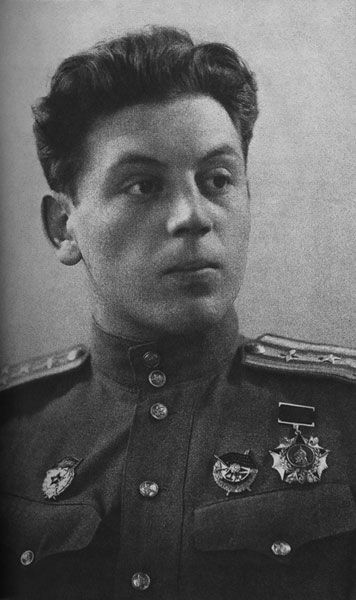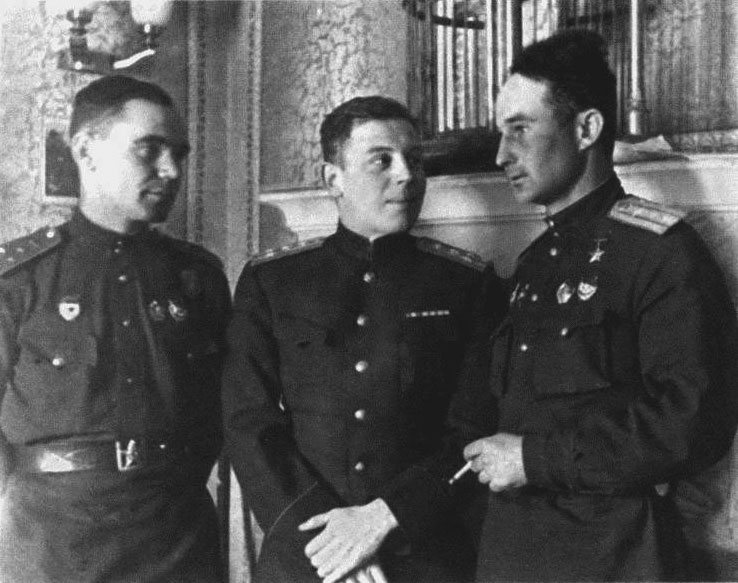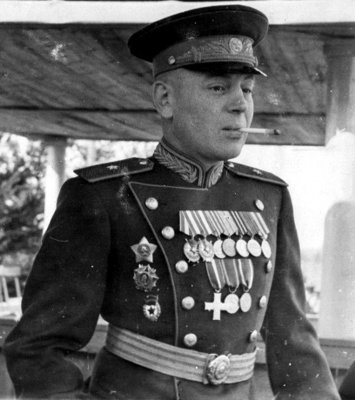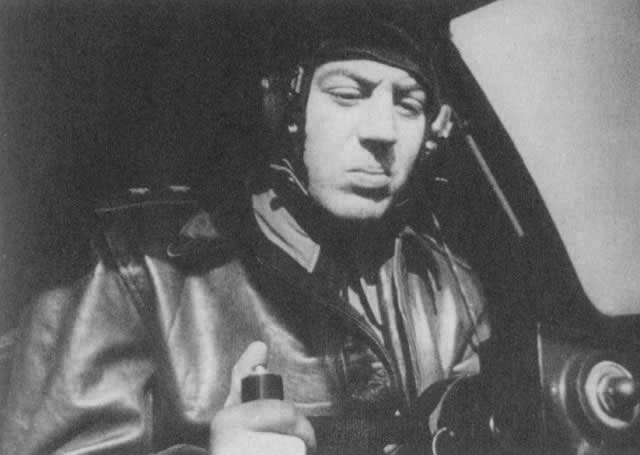Vasily I. Stalin (1921 - 1962)
Youth
Vasily Iosifovich Stalin was born in Moscow on March 21, 1921. He was the first child of Joseph V. Stalin and his second wife, Nadezhda S. Alliluyeva. The Soviet dictator-to-be was already 40 years old when he married the 17-year-old Alliluyeva, and had a 12-year-old son with his first wife and a secret, illegitimate son aged seven. The marriage between Stalin and Alliluyeva, who kept her maiden name, was a difficult affair with lots of quarrelling. Stalin very much wanted a daughter and when Vasily was born in 1921, he was sad. He did not speak to Alliluyeva for a month and eventually Alliluyeva announced that she would leave him. The two made it up again but it took another five years before their second and last child, Svetlana was born.
Alliluyeva showed little interest in her children. The off-and-on relationship with her husband made her increasingly vulnerable to depressions. She confided to a friend: "I’m sick of everything, even the children". According to her cousin Vladimir Redens, Alliluyeva was considered "extremely selfish" by her family. The Nanny complained that Nadya was completely disinterested with regard to the children. From their father too they didn’t receive much attention either. Joseph Stalin was often away and seldom saw his children.
Vasily was often ill during his youth and his health continued to be weak all his life. When Vasily went to school he didn’t show much eagerness for study. He was lazy, got poor grades, fought regularly and was up to much mischief. He was stubborn and disobedient and since he was the Soviet leader’s son, his teachers often were reluctant to reprove him. Vasily’s inclinations were more directed to sport; after school time he loved to play football for hours on end, he also loved boxing and horse riding.
On November 8, 1932, during a banquet in honour of the 15th anniversary of the revolution, Stalin and Alliluyeva had a fight again. Alliluyeva left the room in an angry mood. Several hours later she was found dead in her room with a pistol at her side. She had committed suicide, although the official cause of her death was determined as appendicitis. Stalin was devastated. He cried, had tantrums, was distraught, threatened to commit suicide and blamed everybody for the death of his wife, whom he also accused: "The children will have forgotten her within a few days, but me she has maimed forever."
Svetlana was only 6 years old when her mother passed away. Many of the events she did not grasp. Vasily however endured a huge shock, which, according to his sister: "ruined him completely". This caused Vasily to grow into a nervous boy with an explosive character. He was fretful, violent and very abusive. His father was seldom present and nobody dared to correct Vasily’s behaviour. The guards who were around day and night took upon themselves the role of substitute parents but to them also, Vasily behaved rude and aloof.
Flying school
When in secondary school, Vasily shortly considered to join the artillery, but the romantic image of the aviator appeared more attractive to him. Instead of going to the next grade in secondary school, the 17th year old Vasily chose the air force in the spring of 1938. Vasily received his training as a fighter pilot in the Myasnikov Aviation School in the village of Kacha, situated 20 kilometres north of Sevastopol in the Crimea. The NKVD chief, Lavrenty P. Beria, personally saw to it that nothing was wanting with regard to the son of the great leader. Vasily did not sleep in the cadet quarters, but in a separate guest house and ate in the dining room for executives. Vasily did not object to this privileged treatment. Once he ordered in the canteen an oriental dish that was unknown to the cooks. Especially for him an employee was sent to Sebastopol to find out how this dish should be prepared. When Stalin got news of the living conditions and behaviour of his son he ordered his transfer to the regular barracks and the issue of the standard food and tobacco.
In his first assessment of cadet Vasily Stalin, instructor-pilot Captain Malenkov wrote: "His military discipline is good, he committed some violations of the rules at the start of his training, such as: showing up too late for flight training, appearing unshaven for a flight and having arguments with the group leader (…). Recently, however his discipline has improved considerably; he acknowledges his faults honestly and is eager to subdue them". Of course, the executives were keenly aware that they were dealing with the son of Joseph Stalin, but they also realised that they could not allow discipline to flag; that by favouring Vasily, friction might ensue between the cadets and that overestimating Vasily’s abilities simply might lead to accidents.
From cadet to lieutenant
Vasily took delight in a bit of fun. Regularly he invited colleagues and girls to parties and occasionally went back into the air the next morning with a hangover. However, his behaviour improved steadily and in March 1940 he completed his training with good grades, which resulted in his promotion to Lieutenant. In his last assessment (March 21, 1940, Vasily’s 19th birthday) Marenkov wrote: "Takes an active part in the public life of the unit (…). Is energetic, takes the initiative and is tenacious, as the leader of a detachment he is demanding towards his subordinates and pays attention to their needs. Is sometimes tart in addressing senior commanders. Is personally disciplined, can serve as an example to others, is happy to share his knowledge with comrades. His theoretical advances are outstanding and his flight technique excellent. Is particularly interested in practical subjects but underestimates their theoretical properties (…). He flies excellently in formation. Loves to fly but is sloppy in the preparation of flights. Flight preparation control is essential".
After his training Vasily was assigned to the 16th Fighter Regiment of the 57th Air Brigade which was stationed in the Moscow Military District and where he flew a Polikarpov I-15-fighter. His stay there was but short, for in the autumn of 1940 he went to the Air Force Academy. Again Vasily showed little interest in theoretical issues. Late 1940 he met the vivacious Galina Burdonskaya, the attractive daughter of a state security officer. They were married on New Year’s Eve of that year, both 19 years old. Joseph Stalin was informed after the marriage took place, which did not exactly meet his approval. By way of a telegram he announced: "married – go to hell! I feel sorry for her, to be married to such a blockhead". Vasily and Galina were nonetheless allowed a room in the Kremlin. They had two children: a son, Aleksandr, born in 1941 followed in 1943 by a daughter, Nadezhda.
War breaks out
The Second World War soon affected the Stalin family personally. On July 16th 1941, Vasily’s brother Yakov, who fought on the front as an artillery officer since the early days of the war, was taken prisoner by the Germans. Joseph Stalin, who never got on very well with Yakov, cursed him: "the fool – he could not even shoot himself!" he told Vasily. Yakov’s wife was arrested and for 2 years separated from her three year old daughter. Stalin forbade Vasily to fly combat missions: "One prisoner of war is more than enough for me!"
Although he was not allowed to fly combat missions, Vasily Stalin, now captain, became squadron commander of the 42nd Fighter Regiment. Shortly after his arrival the regiment transferred to Yak-1 fighter aircraft. The pilots did not have any experience with that aircraft yet and were about to receive their first training. For that however, Vasily lacked patience. Without permission he stepped into a Yak. After having flown a perfect flight Vasily requested permission to land by radio: "I am a falcon, can I land?". But Vasily underestimated the distance the Yak needed for landing. The Yak hit a railway embankment with high speed, flipped over the rails and came to a halt, a few meters from a deep ravine. As a result, Vasily was deprived of his beloved wings, but in return received a job with considerable respect: he became Head of the Air Force Inspection. But this staff officer’s job had no attraction for Vasily. His cousin Vladimir Alliluyev wrote about this: "He could not be kept in the rear. He was an active and courageous man. He flew beautifully and wanted strongly to be at the front. There was his place. Doubtlessly".
The promotions of Vasily Stalin followed each other at breakneck pace. He was promoted to Major and in February 1942 to Colonel (he skipped Lt. Col.), while a year earlier he was a mere Lieutenant. In July 1942 Vasily was appointed inspector at the 434th Fighter Regiment, which was stationed just west of Stalingrad. Finally, in December he received permission from his father to fly combat missions.
Debauchery and alcoholism
Vasily flew some combat missions, but when the battle of Stalingrad reached its climax, he returned to Moscow. He took over the family dacha in Zubalovo and hit the bottle. He organised parties and did nothing but eating, drinking dancing and chasing women. The licentious Vasily invited numerous guests: fellow pilots, but also movie stars, writers and ballerinas, including celebrities like film director Roman Karmen, poet Konstantin Simonov and actress Valentina Serova. Vasily knew everyone personally.
In February 1943, Vasily Stalin was officially appointed commander of the 434th Regiment, now renamed 32nd Guards Fighter Regiment. But since he was more occupied with parties and began to develop a chronic alcoholism, his predecessor, Major Babkov, now his deputy, was still in fact, in command. Vasily’s friends did not approve of his behaviour, although at the same time they considered the parties in Zubalovo a welcome escape from the acts of war.
Having spent some time in Zubalovo, Vasily decided to return to the front. He led his regiment in attacks on Velikiye Luki and the bridgehead at Demyansk and on March 5th, 1943 Vasily shot down his first enemy aircraft. This did not mean however that he had bettered his ways. On April 3, 1943 an intoxicated Vasily Stalin got it into his head to set out on a fishing expedition. To that end they threw aircraft missiles with delayed ignition in the water from the edge and then gather the dead fish with nets out of the water. At the fourth projectile things went wrong: the device exploded in the hands of the regimental engineer, who died in the attempt. Vasily got seriously injured by shrapnel and another pilot was slightly injured. Vasily was punished with eight months confinement to quarters. Joseph Stalin decreed "that Colonel Stalin is relieved from his post of regimental commander due to alcoholism and debauchery and the fact that he spoils and destroys the regiment".
With the division to Berlin
For months, Vasily suffered boredom at home, in January 1944 however, his disciplinary confinement came to an end. Once again he received an inspector’s assignment. This time with the 1st Guards Fighter Corps. In May, he received a very good rating, as a result of which, Vasily was promoted commander of the 3rd Guards Fighter Division. He held that position until February 1945, when he was appointed commander of the 286th Fighter Division. With this division he fought in Belarus and eventually in Berlin at the end of the war. Vasily Stalin received a good many awards during the war. Within three years he received five orders and seven medals. He flew 27 combat missions in which he brought down two aircraft. Apart from his alcohol addiction he had shown to be a skilled and passionate pilot who led his units ably.
Things did not go so well with Vasily on a personal level. He regularly beat his wife Galina and he had an affair with the wife of film director Roman Karmen. In 1944, Vasily left Galina, who was then pregnant with their second child and he started an affair with Yekaterina Timoshenko, the beautiful daughter of Marshal Semyon K. Timoshenko. The scions of the Generalissimo and Marshal were married in 1946 and to decorate their elegant villa, Vasily brought a load of war booty from Germany, including gold ornaments, diamonds, carpets and glassware.
After the war
In the meantime, Vasily Stalin and his division were stationed in the German town of Wittstock. On March 1st, 1946 he was promoted to Major General and in July 1946 he assumed command of the 1st Guards Fighter Corps. The culmination of his career was reached when, after having been assistant commander for a year, he became commander of the air forces of the Moscow Military district. Finally, on May 11, 1949 followed his promotion to Lieutenant General. These were ranks and functions that went far beyond Vasily. "Vasily drank heavily every day", according to his aide, " he sometimes failed to appear at work for weeks and could not leave the women alone". Always been a keen sportsman, his main interest was the football team of the Air Force and he was determined to make it the best in its class.
By Yekaterina Timoshenko he had two children, Vasily and Svetlana, but this marriage did not last very long either. In 1949, Vasily married the dignified swimmer Kapitolina Vasilyeva, with whom he had his happiest period of married life. But due to his alcohol addiction, Vasily’s health deteriorated rapidly. "His health is so frail, his stomach is sick, he can’t even eat", his father said. On May 1, 1952, a drunken Vasily Stalin oversaw the May Day Parade in Moscow and although the weather was bad, he gave permission for a flypast. This resulted in the coming-down of two Tupolev-4 bombers, after which Vasily was relieved of his command. He was sent to the General Staff Academy, but even there his stay was short.
In 1953 everything went wrong for Vasily Stalin. His third marriage broke up and on the 5th of May 1953, his father Joseph Stalin died. That he owed his successful career to his father became again evident when he was dishonourably discharged on March 26. On April 28 he was arrested and sentenced to eight years imprisonment due to a long list of crimes, including abuse of his position, high treason, slander, intrigue, the spending of state money and bringing party leaders into disrepute. Several of these accusations were groundless, but were part of the policy of de-Stalinization.
Vasily was detained in the Lefortovo prison and later on in the Vladimir prison. There he wrote a good many letters to explain his situation. He was released on April, 1960. Once again he hit the bottle. He was arrested again, when he applied to the Chinese embassy in an attempt to fly.
On April 28, 1961, Vasily Stalin was released prematurely for health reasons. His surname was compulsory changed in his father’s birth name Dzhugashvili. It was decided that he should live in Kazan. 800 kilometres east of Moskow. He was given a one-bedroom apartment and a pension. He was physically and mentally wrecked however by his alcohol addiction and imprisonment. On January 9, 1962 he married the nurse Maria Nuzberg, but on March 19 he died. Two days after he passed away, on what would have been his 41st birthday, he was buried in the Arskoye Cemetary in Kazan. In 1999 Vasily Stalin was largely rehabilitated. In 2002, his remains were transferred to the Troyekurovskoye Cemetery in Moscow.
Epilogue
Of Vasily Stalin’s four children only his first child (son Aleksandr, born in 1941) was still alive in 2010. He became a fairly successful theatre director and adopted the surname of his mother (Burdonsky). In 2010 there was yet one Stalin descendant alive who still carried the name ‘Stalin’, namely Vasily Stalin’s granddaughter Anastasia Stalina (the daughter of Vasily Stalin’s 2nd child, the daughter Nadezhda).
Part of this article was originally published in the magazine World at War. World at War narrates remarkable, poignant and dramatic stories behind important events, developments and military operations in the recent war history. The emphasis is on the First and Second World War.
Images
Information
- Article by:
- Auke de Vlieger
- Translated by:
- Cor Korpel
- Published on:
- 19-01-2025
- Feedback?
- Send it!
Related books
Sources
- BIALER, S. (RED.), Stalin and his Generals, Westview Press, Inc., Boulder, 1984.
- MONTEFIORE, S.S., Stalin, Orion Books Ltd., Londen, 2004.
- SOKOLOV, B.V., Vasily Stalin, OOO "Ast-Press Kniga", Moskou, 2003.
- 1 uchotnaya kartochka, 4 nagradnye listy (OAN, 2nd ORB, OS2, OL) en 2 uchotno-posluzhniye kartochki concerning V.I. Stalin, Central Archive of the Ministry of Defense of the Russian Federation (TsAMO RF).








